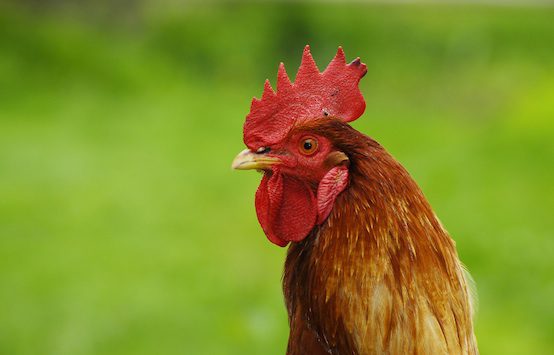Punk Rock and Poultry With a Kick

Johnny Rotten would probably be horrified to be grouped with the likes of today’s foodie counterculture—and, true to character, the odds are good that he would unabashedly vocalize his distaste—but the fact remains that his sneering anarchy is, in some ways, as much of a political statement as the choice to eat and cook locally.
Punk came about as a form of critique. In the beginning, it managed to create a now-iconic counterculture where (often subversive) political commentary could flourish. The anti-establishment attitude resulted in a remarkably hardy group: early punk rockers largely embraced self-promotion, preferring informal and community-based means of production to systematized or formalized industry structures. (Not to mention hard drugs.)
Today, the genteel locavore movement is forming its own, more subtly subversive, counterculture. The strengths of the punk movement—as with any truly sustainable anti-establishment culture—are to be found within those who choose to grow their own food, eat and cook locally, and focus on re-establishing local communities in the face of an ever-growing industry structure. And the movement is anything but a partisan project.
Joel Salatin, a hero among many who hope to return food production and consumption to its local roots, wrote a book titled “Everything I Want To Do Is Illegal,” addressing the difficulties that independent farmers face. He is a champion for local and sustainable agriculture, and a charismatic one at that. Andrea Gabor from The Atlantic wrote about her visit to the “mecca of sustainable agriculture,” Salatin’s Polyface Farms, in 2011. She observed that his appeals to the listener are not only rooted in his trade, but political and moral sentiments as well. Salatin is fulfilling a vocation, creating a counterculture.
As he does frequently during the tour, Salatin digresses to matters more spiritual and political than agricultural: “The pig is not just pork chops and bacon and ham to us. … Our culture doesn’t ask about preserving the essence of pig, it just asks how can we grow them faster, fatter, bigger, and cheaper.”
Salatin is far from alone in his rejection of factory farming and industrialized food. Though Salatin’s rhetoric tends to appeal to the Right, John Schwenkler wrote in 2008 of an unexpected ally on the Left: Alice Waters, the leader of what she calls “the Delicious Revolution.” In a 1997 speech, she seems to echo—though in very different vernacular—what Salatin is saying.
[Schoolyard gardens] “teach redemption through a deep appreciation for the real, the authentic, and the lasting—for the things that money can’t buy: the very things that matter most of all if we are going to lead sane, healthy, and sustainable lives.
Salatin strives to preserve the existence of what Waters calls “the real, the authentic, and the lasting;” sustainability is, like all sound countercultures (punk included) a principled critique.
But the ethical case is not the only one to be made. The factory farming industry is corrupt in precisely the same way that other sprawling industries are: Schwenkler writes that “Official dietary guidelines inevitably became the product of collaboration between government agencies and representatives of the industries that stand to benefit.” (Sid, are you listening?)
The punk movement, in the end, was not particularly conducive to law and order—or sustainable community of any kind, for that matter. It was the earnest, if misguided, rebellion of disenfranchised youth, rejecting legitimate and illegitimate social obligations without scruple.
The essence of the locavore movement on both Left and Right is its unique anti-authoritarian aims: not anarchy for its own sake, but the rejection of what they see to be a corrupted system. Alice Waters’ rebellion seeks to combat corporate and governmental sprawl by cultivating local community; Salatin’s, by rousing it.
Perhaps there’s a little punk in all of us—even while tending the hens.
Comments